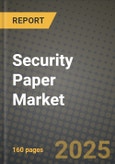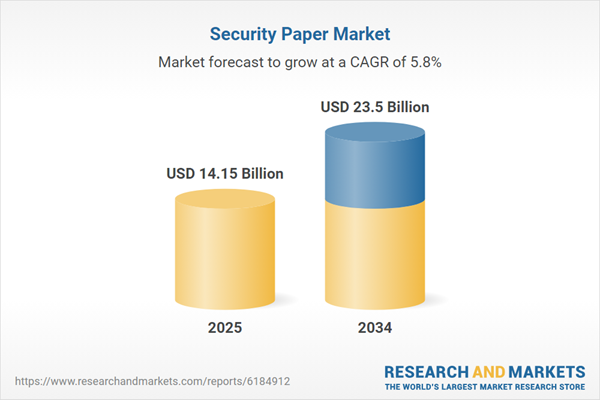Security Paper Market
The Security Paper market encompasses engineered substrates for banknotes, passports, visas, revenue and postage stamps, checks, certificates, brand protection labels, tickets, transit documents, and secure tax stamps. These papers integrate intrinsic features - watermarks, security threads, planchettes, UV/IR fibers, polymer windows, and taggants - with extrinsic print features such as intaglio, rainbow printing, microtext, latent images, and optically variable devices. Momentum is shaped by rising identity fraud, illicit trade, counterfeiting, and border security needs, alongside modernization of civil registries, e-passport programs, and excise compliance for tobacco, alcohol, and pharmaceuticals. Parallel forces include the shift to polymer or hybrid banknotes in select countries, digitization of payments and identity, and the convergence of paper security with machine-readable, forensic, and digital-authentication layers. The competitive landscape blends specialized mills, government mints/printers, security integrators, and brand-protection providers that co-develop bespoke feature sets per issuing authority. Differentiation hinges on feature robustness against copying and simulation, durability in harsh circulation environments, pressroom compatibility, and lifecycle economics from issuance to verification. Suppliers prioritize fiber sourcing, controlled furnish and formation, embedded feature precision, surface chemistry for inks and coatings, and in-line inspection. Challenges include balancing citizen convenience with security rigor, ensuring feature auditability for law enforcement, resisting low-cost counterfeit techniques, and aligning with sustainability expectations through recycled content where feasible, lower water and energy intensity, and end-of-life considerations. Growth opportunities emerge in emerging market currency reissues, national ID upgrades, travel document capacity expansions, and excise/tax-stamp mandates targeting revenue leakage.Security Paper Market Key Insights
- Hybrid substrates redefine durability and design freedom. Issuers increasingly evaluate cotton-polymer hybrids and full polymer windows for banknotes and high-traffic credentials. Hybrids preserve familiar paper tactility while adding soil resistance, longer circulation life, and windowed features that defeat casual simulation. Mill capability to co-extrude or integrate window foils during sheet formation is a decisive tender criterion. Press compatibility, folding endurance, and anti-soiling coatings determine real-world performance and replacement cycles.
- Next-gen threads and watermarks raise bar against digital simulation. Multi-tonal watermarks, pixel watermarks, and 3D effects coupled with micro-optic or demetallized threads deliver parallax, dynamic movement, and color-shift cues visible to the public. Machine-readable thread zones synchronize with validators, enabling high-speed sorting and counterfeit detection. Credible designs balance overt cues for citizens and covert/forensic layers reserved for trained inspectors.
- Taggants and forensic chemistry tighten supply-chain control. Rare-earth, magnetic, and molecular taggants embedded in furnish or coatings enable field screening and lab-level authentication down to batch granularity. Controlled distribution and audit trails for taggant concentrates reduce diversion risk. Co-development with excise agencies links taggants to digital tax-stamp systems for cross-channel enforcement and analytics. Compatibility with recycling and health standards is a procurement requirement.
- Surface engineering elevates print fidelity and resistance. Sizing, surface strength, and coating recipes are tuned for intaglio bite, offset detail, and ink adhesion under humid or dusty conditions. Anti-stain and anti-soil chemistries preserve banknote cleanliness; anti-bleach and anti-solvent barriers resist chemical washing. Anti-copy screens and micro-perforations complicate scanner replication without impeding high-speed press throughput.
- Machine readability and automation drive lifecycle economics. Papers are specified for reliable detection by ATMs, validators, and high-speed sorters using UV/IR responses, magnetic signals, and reflectance profiles. Stable signals reduce false rejects and downtime across cash centers and border kiosks. Interoperability with legacy equipment is essential during multi-year transitions; vendors supply calibration targets and acceptance kits.
- Design for people: human factors matter as much as physics. Tactile intaglio marks, raised features, and large numerals improve use by low-vision and elderly citizens. Public education kits and retailer guides align behavior with security design. Color palettes, denomination logic, and intuitive cues reduce handling errors and increase counterfeit recognition without specialist tools.
- Sustainability and stewardship enter RFP scorecards. Mills invest in certified fiber, closed-loop water, energy-efficient dryers, and solvent recovery. Recycled fiber use is evaluated case-by-case to protect feature integrity; where unsuitable, mills demonstrate alternative impact reductions. Transparent environmental product declarations and take-back options for trim and security waste improve tender rankings.
- Convergence with digital authentication expands value. Security paper now anchors omnichannel trust: printed documents carry serialized, encrypted elements linked to mobile verification apps and government registries. Tamper-evident tear zones and anti-lift varnishes protect applied labels or MRZ/ICAO data pages. Issuers seek modular designs that accommodate future digital overlays without substrate changes.
- Resilience and capacity planning are strategic differentiators. Dual-mill redundancy, regional finishing hubs, and secure logistics protect against geopolitical or disaster disruption. In-line 100% inspection with defect mapping reduces rework and assures batch uniformity. Vendors offering rapid design-change tooling and agile prototyping support accelerated reissue schedules after threat spikes.
- Brand protection and tax enforcement expand beyond currency. Secure papers with overt/covert features move into revenue stamps, warranties, certificates, and luxury packaging. Integration with serialization and track-and-trace curbs diversion and gray markets. Print partners that bridge secure substrates and specialty inks simplify procurement for brand owners and ministries alike.
Security Paper Market Reginal Analysis
North America
Demand is driven by currency modernization, secure ID upgrades, and robust brand-protection programs. Agencies emphasize machine-readability, validator compatibility, and tactile accessibility features. Sustainability disclosures and domestic supply resilience are scrutinized in procurements. Private-sector adoption focuses on tax stamps, certificates, and high-value labels tied to digital verification.Europe
A mature ecosystem with stringent standards in banknote and passport security, high adoption of hybrid/polymer features, and rigorous environmental criteria. Cross-border interoperability of IDs and travel documents guides design choices. Vendors compete on advanced threads, complex watermarks, and low-soiling coatings, while recyclability and energy footprints influence framework awards.Asia-Pacific
Significant growth from currency reissues, national ID expansions, and excise/tax-stamp programs. Governments seek cost-effective yet sophisticated overt features complemented by machine-readable layers for bulk processing. Regional mills scale capacity, and partnerships with state printers accelerate deployments. Durability in tropical climates and anti-soiling performance are key differentiators.Middle East & Africa
Modernization agendas include e-passports, visas, and excise controls to protect state revenues. Specifications favor highly overt features for public recognition and robust covert/forensic layers for enforcement. Supply-chain security, training for inspectors, and climate-adapted papers (heat/sand resistance) are critical. Multi-year framework agreements emphasize rapid rollout and logistics reliability.South & Central America
Upgrades target currency security, civil registry documents, and tax stamps to combat illicit trade. Procurement weighs lifecycle costs, validator compatibility, and local finishing capability. Vendors offering technical training and public awareness materials gain advantage. Resilience to humidity and handling wear, plus strong anti-bleach/solvent resistance, are essential in high-circulation contexts.Security Paper Market Segmentation
By Type
- Hybrid Paper
- Watermark
- Hologram
- Thread & UV Fiber
- Others
By Application
- Currency Notes/Bank Notes
- Passport & Visa
- Identity Card
- Legal & Government Documents
- Certificate
- Bank Documents
- Medical Report & Prescription
- Transportation & Logistics
- Others
Key Market players
De La Rue, Portals Paper, Crane Currency, Papierfabrik Louisenthal (Giesecke+Devrient), VHP Security Paper, Landqart AG, Fedrigoni (Fabriano Security), Security Papers Limited (Pakistan), Pura Group, Ahlstrom, Koehler Paper, Goznak, China Banknote Paper, Neenah (Mativ), DomtarSecurity Paper Market Analytics
The report employs rigorous tools, including Porter’s Five Forces, value chain mapping, and scenario-based modelling, to assess supply-demand dynamics. Cross-sector influences from parent, derived, and substitute markets are evaluated to identify risks and opportunities. Trade and pricing analytics provide an up-to-date view of international flows, including leading exporters, importers, and regional price trends.Macroeconomic indicators, policy frameworks such as carbon pricing and energy security strategies, and evolving consumer behaviour are considered in forecasting scenarios. Recent deal flows, partnerships, and technology innovations are incorporated to assess their impact on future market performance.
Security Paper Market Competitive Intelligence
The competitive landscape is mapped through proprietary frameworks, profiling leading companies with details on business models, product portfolios, financial performance, and strategic initiatives. Key developments such as mergers & acquisitions, technology collaborations, investment inflows, and regional expansions are analyzed for their competitive impact. The report also identifies emerging players and innovative startups contributing to market disruption.Regional insights highlight the most promising investment destinations, regulatory landscapes, and evolving partnerships across energy and industrial corridors.
Countries Covered
- North America - Security Paper market data and outlook to 2034
- United States
- Canada
- Mexico
- Europe - Security Paper market data and outlook to 2034
- Germany
- United Kingdom
- France
- Italy
- Spain
- BeNeLux
- Russia
- Sweden
- Asia-Pacific - Security Paper market data and outlook to 2034
- China
- Japan
- India
- South Korea
- Australia
- Indonesia
- Malaysia
- Vietnam
- Middle East and Africa - Security Paper market data and outlook to 2034
- Saudi Arabia
- South Africa
- Iran
- UAE
- Egypt
- South and Central America - Security Paper market data and outlook to 2034
- Brazil
- Argentina
- Chile
- Peru
Research Methodology
This study combines primary inputs from industry experts across the Security Paper value chain with secondary data from associations, government publications, trade databases, and company disclosures. Proprietary modeling techniques, including data triangulation, statistical correlation, and scenario planning, are applied to deliver reliable market sizing and forecasting.Key Questions Addressed
- What is the current and forecast market size of the Security Paper industry at global, regional, and country levels?
- Which types, applications, and technologies present the highest growth potential?
- How are supply chains adapting to geopolitical and economic shocks?
- What role do policy frameworks, trade flows, and sustainability targets play in shaping demand?
- Who are the leading players, and how are their strategies evolving in the face of global uncertainty?
- Which regional “hotspots” and customer segments will outpace the market, and what go-to-market and partnership models best support entry and expansion?
- Where are the most investable opportunities - across technology roadmaps, sustainability-linked innovation, and M&A - and what is the best segment to invest over the next 3-5 years?
Your Key Takeaways from the Security Paper Market Report
- Global Security Paper market size and growth projections (CAGR), 2024-2034
- Impact of Russia-Ukraine, Israel-Palestine, and Hamas conflicts on Security Paper trade, costs, and supply chains
- Security Paper market size, share, and outlook across 5 regions and 27 countries, 2023-2034
- Security Paper market size, CAGR, and market share of key products, applications, and end-user verticals, 2023-2034
- Short- and long-term Security Paper market trends, drivers, restraints, and opportunities
- Porter’s Five Forces analysis, technological developments, and Security Paper supply chain analysis
- Security Paper trade analysis, Security Paper market price analysis, and Security Paper supply/demand dynamics
- Profiles of 5 leading companies - overview, key strategies, financials, and products
- Latest Security Paper market news and developments
Additional Support
With the purchase of this report, you will receive:- An updated PDF report and an MS Excel data workbook containing all market tables and figures for easy analysis.
- 7-day post-sale analyst support for clarifications and in-scope supplementary data, ensuring the deliverable aligns precisely with your requirements.
- Complimentary report update to incorporate the latest available data and the impact of recent market developments.
This product will be delivered within 1-3 business days.
Table of Contents
Companies Mentioned
- De La Rue
- Portals Paper
- Crane Currency
- Papierfabrik Louisenthal (Giesecke+Devrient)
- VHP Security Paper
- Landqart AG
- Fedrigoni (Fabriano Security)
- Security Papers Limited (Pakistan)
- Pura Group
- Ahlstrom
- Koehler Paper
- Goznak
- China Banknote Paper
- Neenah (Mativ)
- Domtar
Table Information
| Report Attribute | Details |
|---|---|
| No. of Pages | 160 |
| Published | November 2025 |
| Forecast Period | 2025 - 2034 |
| Estimated Market Value ( USD | $ 14.15 Billion |
| Forecasted Market Value ( USD | $ 23.5 Billion |
| Compound Annual Growth Rate | 5.8% |
| Regions Covered | Global |
| No. of Companies Mentioned | 15 |









